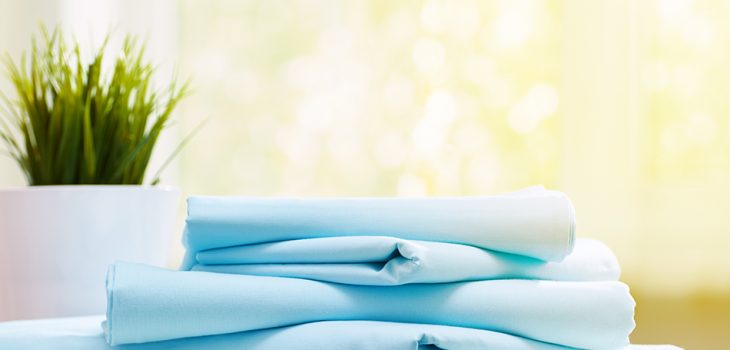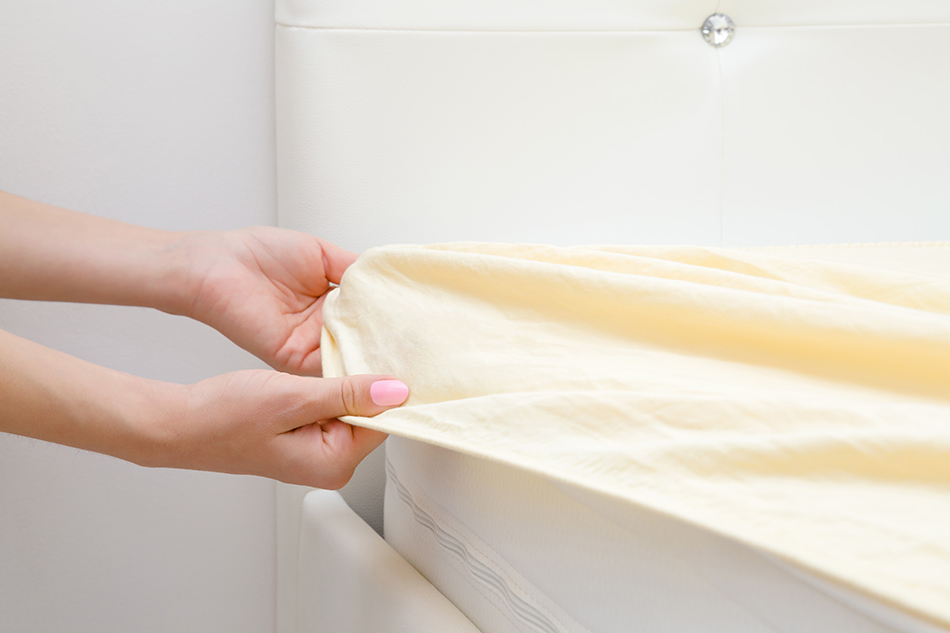You’ve just received your freshly delivered bedding set from the store and can’t wait to sleep on the soft new sheets. But before you put them on your bed and enjoy the luscious fabric, stop right there! Should you wash new sheets or use them straight out of the packet?
Fortunately for you, we have all the necessary information you need right here. Find out why and how you should wash new sheets by reading this article now.
Why You Should Wash New Sheets
When you take your new sheets out of their packaging, they look clean and crisp as though they’re ready to be used. But the reason they look so good is because of the additives in the fabric. Starch and sizing are the chemicals that are used in processing bed sheets.
These additives give the fabric a crisp and smooth finish to make the sheets look good and prevent them from wrinkling.
This is due to the fact that the additives around the fibers create a protective barrier between the sheets. The sizing chemicals can either be plastic or plant-based.
Some bed sheets, even the soft silky ones, can feel stiff or scratchy when they are first taken out of the packaging. This is purely because of the additives in the fabric. And you wouldn’t want to expose your skin or your family to such chemicals!
Some people may experience an itchy, irritating sensation when sleeping on new, unwashed sheets.
So regardless of whether you buy cotton, silk, or satin bedding, to avoid skin reactions, it’s advisable to wash your new sheets first before use. A little soap and water will have them smelling fresh and clean. After all, doesn’t everyone want to have a better sleep on fresh-smelling sheets as well as to protect their skin?
Many bedding textiles that were made in one country are dyed or stitched in another. The well-traveled fabrics may contain a blend of chemicals, including formaldehyde resin, which is used to prevent mold from forming on the fabric.
Most manufacturers nowadays will use such packaging chemicals on the sheets to keep moths and bugs at bay while the products sit on shelves.
The formaldehyde resin may be good for the fabric, but it poses the risk of causing respiratory problems, such as chest pain, breath shortness, or coughing. Asthma and allergy sufferers will be at a higher risk of developing adverse reactions to these chemicals.
Polyester and acrylic are synthetic fabrics that get their color from chemical dyes. These azo-aniline dyes can end up on your skin and cause a negative reaction, such as eczema, red patches, dry and inflamed skin, or sweat marks.
It can take several washes to get rid of the excess dye so be sure to wash your new sheets separately to prevent the fabric dyes from leaking into your clothes.
Bed sheets with deep colors won’t fade easily. But if you wash them for the first time and notice some fading, it’s a good indication of the quality of the bedding, in which case you can ask for a refund.
Other defects in bedding can also become apparent after a wash or two. From loose fibers to holes and tears appearing on the sheets, you will only know about the quality of your new sheets after washing them for the first time. If you notice such defects, you’ll be able to get your money back or exchange the sheets for a better quality set.
What If the Sheets are Organic?
While it’s a great idea to buy breathable organic sheets, especially if you have sensitive skin, you should know that just because the sheets are organic, it doesn’t mean there are no chemicals used in them.
Organic cotton is not exposed to wrinkle-resistant additives or formaldehyde resin products, but it is still processed on machines and often packaged in plastic covering. It is best to wash your organic sheets to get rid of any chemical residues.
6 Ways to Wash New Sheets
So you’ve bought your new sheets and have decided to wash them before use. Before we give you tips on how to wash your new bedding set, it’s always a good idea to read the cleaning instructions on the label. There are important factors to consider, such as the color and material of the sheets.
For example, if the sheets are 100% cotton or a blend of polyester and cotton, you can easily wash them in warm water. Flannel sheets, on the other hand, are delicate fabrics that are sensitive to high temperatures.
They will peel and shrink when exposed to hot water. These sheets are best washed in cold water and air-dried to avoid damage. The same goes for dark-color fabrics; always wash them in cold water and dry them at low temperatures.
Here are 6 ways you can wash your new sheets:
- Baking soda and vinegar – This solution will soften your sheets. With just one cup of baking soda and half a cup of vinegar, you can skip the detergent. This natural mixture will remove the harmful substances from the sheets without harming the fabric. Wash with warm water to loosen the fibers and give them a fresh smell!
- Air-dry the sheets – To get your bedding set as soft as possible, let them air dry instead of using the tumble dryer. The heat from the tumble dryer can damage the fibers in the sheets. Instead, hang them outside in the sun or leave them on the clothes rack overnight to dry.
- Use dryer sheets – Dryer sheets are the alternative to fabric softeners. These sheets minimize static and make the bedding smell great. Dryer sheets will also aid in reducing that distinctive odor that you get from the new sheets.
- Iron the sheets – If you want to maintain the appearance of your new bedding, just iron them! Ironing will eliminate creases or wrinkles and make them look great.
- Wash with mild detergent – washing your new bedding set with mild detergent is another excellent way of getting rid of those harmful chemicals. The old smell of the sheets will be eliminated after the first wash.
We recommend using detergents that are suitable for sensitive skin to freshen your sheets. Avoid high-temperature wash cycles and always read the cleaning instructions on the label so as not to ruin your bedding set. - Add borax – Just half a cup of borax in a tub of cool water will soften and freshen up your new sheets. Leave them overnight in this solution before washing your sheets the next day.
Good to know: It’s always a good idea to keep your freshly washed bedding in a dry and cool place. While air-drying in the sunlight has its benefits, you shouldn’t dry your dyed sheets more than once every couple of months in the direct sun as this will fade their colors.
After the initial wash, you should make a habit of washing your bedding set at least once every two weeks, or more during hot summer months when sweating is more likely. By regularly washing your sheets, you will protect your overall health and ward off bacteria, bugs, and mold from developing in the fabrics.
Step-by-Step Guide on Washing Sheets For the First Time
With all the above methods of washing your new sheets, you should now be ready for the initial wash. Take your time to give your bedding set a thorough cleaning to wash away the preservatives and additives. Follow these steps to wash new sheets for the first time:
Step 1: Select the cold water cycle on your washing machine.
Step 2: Add baking soda and vinegar (but not together) or one cup of mild detergent.
Step 3: Place the sheet in the machine and close the lid.
Step 4: Add a cup of white vinegar to the final rinse cycle (optional).
Step 5: Take out the sheet from the machine.
Step 6: Air dry the sheet.
Step 7: If you choose to dry your sheet in a tumble dryer, you must select the low heat cycle. Otherwise, your sheet’s color will fade or the fibers will get stringy.
Good to know: when you are washing your new sheets, make sure you add the baking soda separately to the vinegar as the mixture will reduce the vinegar’s effectiveness. The detergent section of your washing machine has separate compartments for this purpose.
For best results, add the baking soda at the beginning of the wash cycle, then add the vinegar for the final rinse so as to maximize the vinegar’s effect.
In Summary
So the answer to the question should you wash new sheets is a big yes! Now you know exactly why and how you should wash your new bedding set before use.
You’ll want to sleep comfortably on your new sheets after all! Fresh smelling washed sheets always feel much better than the unwashed ones, don’t you think?








